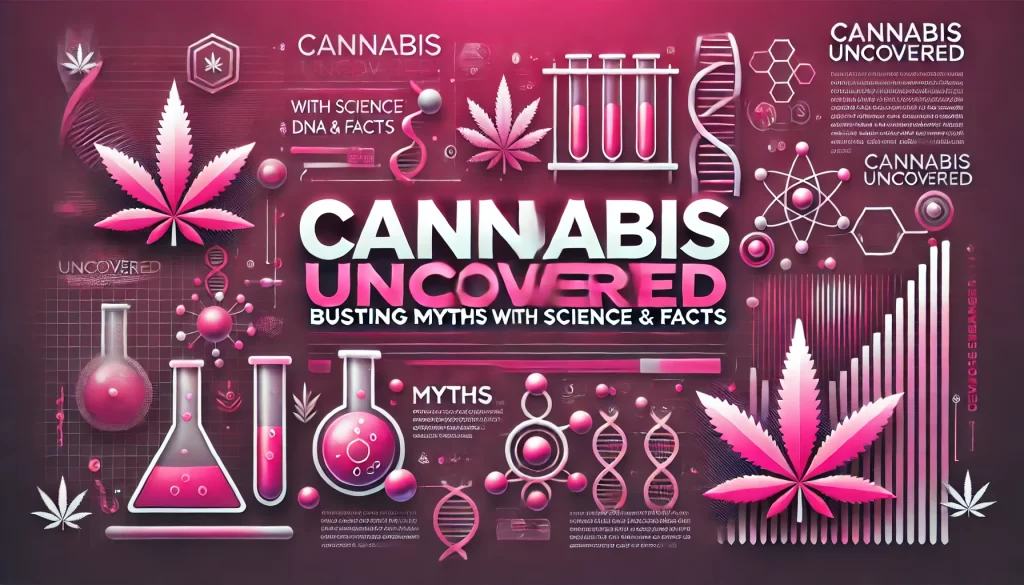For years, cannabis has been trapped in a whirlwind of myths, half-truths, and political debate. From exaggerated fears about addiction to unfounded claims of being a “gateway drug,” misinformation has shaped much of the conversation. But as legalization expands and research accelerates, it’s time to set the record straight.
Are you tired of hearing contradictory claims about cannabis? Wondering what’s real and what’s just hype? You’re not alone.
In this deep dive, we’ll debunk the most persistent cannabis myths with hard data, expert insights, and real-world evidence. Whether you’re exploring medical cannabis or just curious about its effects, this guide will help you separate fact from fiction.
Myth #1: “Cannabis Leads to Harder Drugs”
Reality: Correlation ≠ Causation
The “gateway drug” theory has been around for decades, but science doesn’t support it. A 2021 study by the National Academies of Science found no direct link between cannabis use and harder substances. Instead, factors like environment, mental health, and genetics play a bigger role.
Key Findings:
- Most drug use begins with alcohol or tobacco, not cannabis.
- Legal states like Colorado haven’t seen spikes in heroin or meth use post-legalization.
- Countries with legal cannabis (e.g., Portugal, Canada) report lower opioid crises.
Food for Thought: If alcohol is legal and widely used, why isn’t it labeled a “gateway drug”?
Myth #2: “Cannabis Has No Medical Value”
Reality: A Growing Body of Evidence Says Otherwise
From chronic pain to epilepsy, cannabis is proving its worth in modern medicine.
Proven Benefits:
- Chronic Pain: CBD and THC reduce inflammation and neuropathic pain.
- Epilepsy: FDA-approved Epidiolex (CBD-based) cuts seizures in rare forms of epilepsy.
- Mental Health: Low-dose THC and CBD show promise for PTSD and anxiety.
But Beware: Not all cannabis products are equal. Always consult a doctor before use.
Myth #3: “Legalization Causes Crime and Chaos”
Reality: Data Shows the Opposite
Critics warned that legalization would lead to societal breakdown. Instead:
- Colorado’s crime rates stayed stable post-legalization.
- Tax revenue surpassed $422 million in 2022, funding schools and infrastructure.
- Teen use initially rose but then stabilized, suggesting regulation works.
Bottom Line: Legalization hasn’t brought the apocalypse—just smarter policies.
Myth #4: “Cannabis Isn’t Addictive”
Reality: It Can Be—But Not Like Nicotine or Alcohol
While cannabis is less addictive than many substances, about 9% of users develop Cannabis Use Disorder (CUD). Risk factors include:
- Starting in adolescence.
- Heavy, frequent use.
- Underlying mental health conditions.
Self-Check: If you feel anxious without cannabis or struggle to cut back, you might be at risk.
Myth #5: “All Cannabis Is the Same”
Reality: Strains and Compounds Matter
Not all cannabis is created equal. Key differences:
| Compound | Effects | Best For |
|---|---|---|
| THC | Psychoactive (“high”), pain relief | Recreation, appetite stimulation |
| CBD | Non-psychoactive, anti-inflammatory | Anxiety, pain, inflammation |
| CBG/CBN | Emerging benefits (sleep, focus) | Specialty medical uses |
Pro Tip: Know what you’re consuming—check labels and lab reports.
Myth #6: “CBD Cures Everything”
Reality: It’s Powerful, But Not a Miracle Cure
CBD has been hyped for everything from cancer to wrinkles. While it does help with:
- Anxiety (studies show reduced symptoms).
- Inflammation (arthritis patients report relief).
- Epilepsy (FDA-approved for seizures).
…it’s not a cure-all. The FDA has cracked down on companies making false claims.
Rule of Thumb: If it sounds too good to be true, it probably is.
Myth #7: “Cannabis Is 100% Safe”
Reality: No Substance Is Risk-Free
While cannabis is safer than alcohol or tobacco, risks exist:
- Lung health: Smoking irritates lungs (try vaping or edibles instead).
- Mental health: High-THC strains may worsen anxiety or psychosis in some.
- Driving impairment: Cannabis can slow reaction times (don’t drive high).
Moderation is key.
Myth #8: “Research on Cannabis Is Weak”
Reality: Science Is Catching Up
After decades of restrictions, cannabis research is booming. Recent breakthroughs:
- Pain relief: Cannabis reduces opioid dependence.
- Neuroprotection: CBD may help with Alzheimer’s and Parkinson’s.
- Cancer support: THC/CBD ease chemo side effects (though they don’t cure cancer).
The Future: More studies are needed, but the evidence is promising.
Final Thoughts: Knowledge Over Fear
Cannabis isn’t a devil or a miracle—it’s a complex plant with real benefits and risks. By busting myths, we pave the way for smarter policies and safer use.
What’s Next?
- Share this guide to combat misinformation.
- Explore strains that fit your needs (medical vs. recreational).
- Stay curious—science evolves, and so should our understanding.
Got questions? Check out our FAQ section below.
FAQs
1. Can cannabis cause lung cancer?
No strong link exists for cannabis-only smokers, but vaping/edibles are safer.
2. Is cannabis more addictive than alcohol?
No—alcohol dependence rates are higher (15% vs. 9% for cannabis).
3. Does CBD show up on drug tests?
Pure CBD won’t, but full-spectrum products may contain trace THC.
4. Can cannabis help with insomnia?
Yes, indica strains or CBN products are popular for sleep.
5. Is microdosing cannabis effective?
Many professionals use small doses for focus—experiment carefully.

